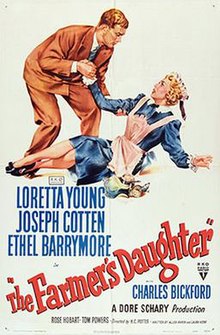The Farmer's Daughter (1947 film)
| The Farmer's Daughter | |
|---|---|

theatrical release poster
|
|
| Directed by | H. C. Potter |
| Produced by | Dore Schary |
| Written by |
Hella Wuolijoki (play) Allen Rivkin Laura Kerr |
| Starring |
Loretta Young Joseph Cotten Ethel Barrymore Charles Bickford |
| Music by | Leigh Harline |
| Cinematography | Milton R. Krasner |
| Edited by | Harry Marker |
| Distributed by | RKO Radio Pictures Inc. |
|
Release date
|
|
|
Running time
|
97 minutes |
| Language | English |
| Box office | $3.3 million (US rentals) |
The Farmer's Daughter is a 1947 American film that tells the story of a farmgirl who ends up working as a maid for a Congressman and his politically powerful mother. It stars Loretta Young, Joseph Cotten, Ethel Barrymore, and Charles Bickford, and was adapted by Allen Rivkin and Laura Kerr from the play Juurakon Hulda by Hella Wuolijoki, using the pen name Juhani Tervapää. It was directed by H.C. Potter.
The film won the Academy Award for Best Actress for Loretta Young and was nominated for Best Actor in a Supporting Role for Charles Bickford. Young's win was considered an upset; everyone had expected Rosalind Russell to win for her Lavinia in Mourning Becomes Electra.
In 1963, a television series based on the film was produced, starring Inger Stevens, Cathleen Nesbitt and William Windom.
Katie Holstrom (Loretta Young), a Swedish-American, leaves the family farm to go to nursing school in Capitol City. Barn painter Adolph Petree (Rhys Williams), who had completed a job for Katie's father, offers her a ride, but robs her of her money. Katie, refusing to ask her family for help, goes to work as a maid in the home of political power broker Agatha Morley (Ethel Barrymore) and her son, U.S. Representative Glenn Morley (Joseph Cotten). Soon, she impresses Agatha and her loyal majordomo Joseph Clancey (Charles Bickford) with her refreshing, down-to-earth common sense and Glenn with her other charms.
...
Wikipedia
